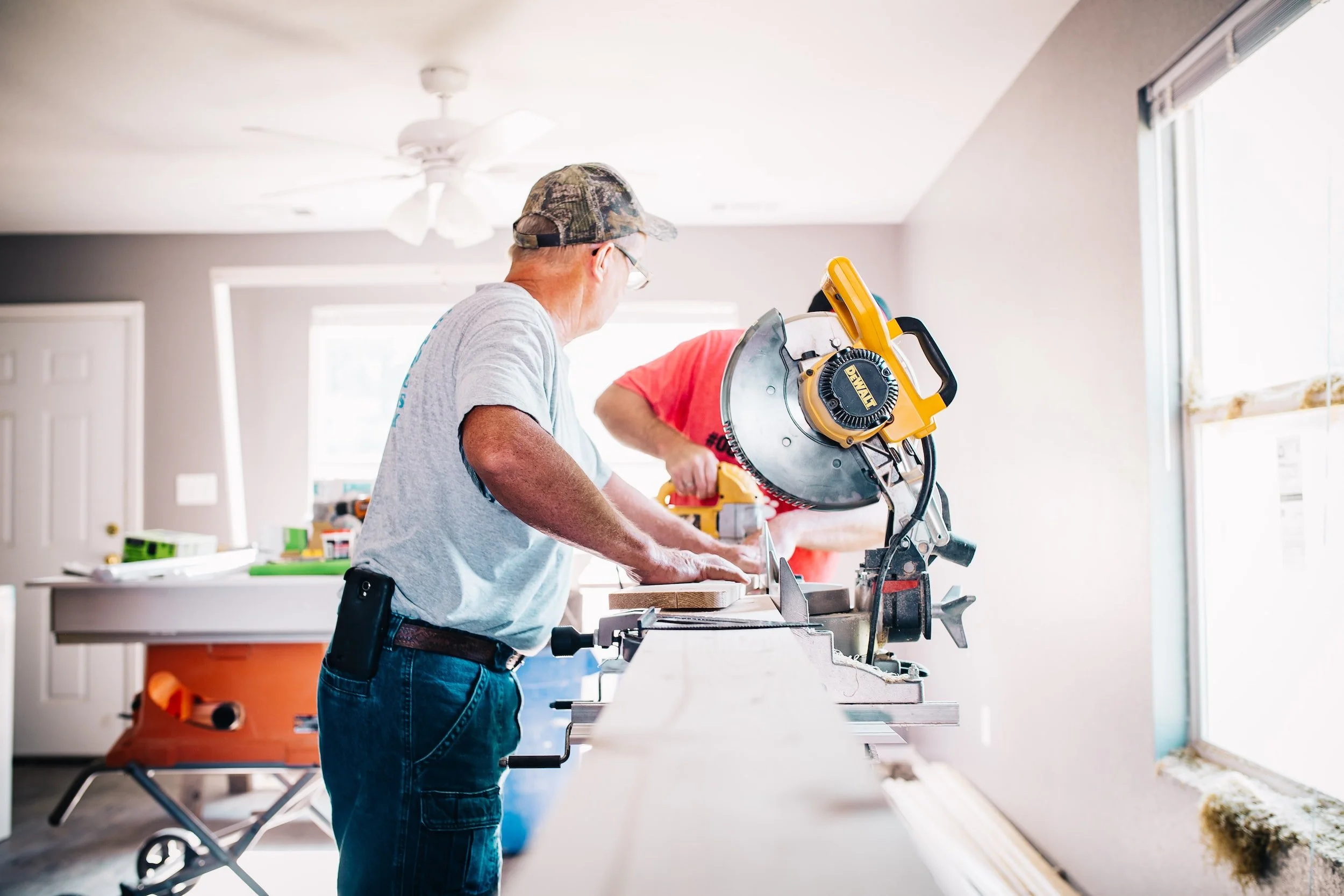The past few months I’ve noticed an uptick in questions swirling around finances. The uncertainty of the economy, the increased cost of living, and the surging home values in recent years have many hard working families scrambling to get back on track.
Many have big goals, but the financial pressure have them wondering if and when those dreams can become a reality.
My job is to be a resource for you all, so although I am not a financial advisor or mortgage expert… I know some of the best in the business! I brought some of the questions I’ve been receiving to two of my trusted experts and would like to share their advice.
Let’s focus and get that Financial Confidence that we all deserve!
Meet the experts
Let me first briefly introduce you to my sources. I highly recommend these professionals if you have further questions around your financial planning or loan options.
Alvin Clay - Alvin Clay Financial Advisors - www.alvinclay.com
One of the best in the business! Alvin Clay has an incredible reputation in the industry with over 35 years experience. I have the privilege to be able to pick his brain often because he’s my Dad :) I’m giving you some of his professional thoughts on some of your pressing questions!
Patrick Delaney - Area Sales Manager, Union Mortgage - www.uhm.com/pdelaney/
As a Realtor, I work with mortgage lenders every day. Having strong business relationships with lenders I trust is critical to my ability to serve my clients. Pat is one of the lenders I refer to clients. I trust Pat to provide clients with a high level of customer service, help guide them on the right path to a loan approval, and assure our clients are financially comfortable with their purchase.
Following are the expert responses to a few financial questions. Let me know if you have additional questions that have been weighing on your mind that we can answer for you!
Love it or List it?
In today's environment, more homeowners are asking for guidance on if they should list their home, or if renovating is a better option. What are your thoughts around how homeowners should consider what’s best for their situation?
AC: “It really depends on what types of renovations they want to do and how long they will stay in the house after the renovations. If the renovations don't add value, and they plan to sell in a year or two anyway, it doesn't make sense. They may get a lower price on the house they are selling because of higher interest rates, but they will also get a lower price on the house they are buying. Assuming the new house is a more expensive house, they are likely to save more on the purchase than they are losing on the sale. e.g., if both houses lost 10% in value, the more expensive house lost more. And if rates come down, they can refinance.”
I recently helped a neighbor think through this very concept. They were preparing to do some major renovations and wanted to make sure they were not over investing in their property. I put together a Comparative Market Analysis to help them study the potential market value of their property post-renovation. We had a conversation around their overall plans and how long they expect to be in the home. In this situation, the renovations made sense and would likely turn a profit in the long run.
Reach out to me if you need similar data to help you analyze what projects make sense for you: emily.woods@veryre.com
Renovation finance options
There are multiple ways for someone to finance their home renovation project. I’ve been asked this one a few times this past year! Everyone’s situation is again different, so you should lean on your financial advisor to determine which option works best for you.
Home Equity Loan
AC: “A Home Equity Loan can be used for any purpose and is simply a loan secured by a mortgage on your home. It is typically a second mortgage, standing behind the primary mortgage loan that was used to purchase the home. That simply means that if the home is sold or foreclosed, the 1st mortgage gets paid 1st. The Home Equity Loan is technically more risky for the lender, so its rate will be a little higher than a 1st mortgage and its term shorter -- usually 10 years.”
Home Equity Line of Credit
AC: “A Home Equity Line of Credit, or HELOC, is like having a credit card that is secured by your home, only at a much more favorable variable rate. The borrower can draw on the credit line or pay it back at will, and for any purpose. HELOCs typically have a term of 10 years, but often can be renewed. HELOCs are the most flexible alternative. It really comes down to whether the borrower wants a fixed or variable rate and whether they want to be able to continue to borrow and repay as needed.”
Construction Loan
AC: “A construction loan is almost always a variable rate loan and is for the specific purpose of funding construction. The lender typically releases the loan in tranches based on the percentage of completion of the project. When construction is completed, the construction loan is typically converted to a permanent loan, like a Home Equity Loan or a HELOC. If money is being borrowed to improve a house, a construction loan may be required first, because the home improvement will increase the value of the house and create more equity to support a HELOC or Home Equity Loan.”
Tips on Saving
Are you planning on a home purchase within the next 2 years? I know many are concerned with the ability to save in an environment where cost of living is squeezing their pockets. Here are some tips on saving for that down payment and positioning yourself for a loan approval!
AC: “Prepare a household budget. Eliminate or reduce unnecessary expenditures. Pay off credit card debt first. Then treat savings as another household bill. Put your savings in a separate account and leave it there. If the money is going to be used in just 2 or 3 years, find a high-rate internet bank and put it there. Do not subject it to the stock market.”
Lender Tips
PD:
First and foremost, speak to a lender upfront so a pathway to homeownership can be created. Limit the people you allow to pull your credit as it could have an impact. Chances are if you’re a year away or within a year there is a good possibility you may need multiple pulls. So interview who you would like, but pick one person to create the Pathway Home”
Limit your purchases within that year or limit them to items you discussed with your trusted advisor. Know what you can spend money on and still qualify for your home loan.
Really focus on your budget! I can’t emphasize this enough. Some people will often qualify for more than they want to or are comfortable spending! Make sure you allocate things that are important to you like dining out, traveling, or perhaps starting a family! Plan for these events so you do not become house poor.
2023 Economic prediction
Here is the magic question! Everyone wants to know what the crystal ball says about the future of the economy. There are many different opinions and the truth is that no one really knows exactly what is to come. However I asked our experts what their 2023 economic prediction is:
AC: “Probably a mild recession in 2023. The stock market will be looking forward to a recovery and should be flat to up a little. But of course, nobody knows.”
PD: “I think 2023 is going to be a challenging year again for the real estate market. Mortgage Banker Estimates have total applications down 10% over 2022 and not recovering until 2024. Lower interest rate predictions should increase refinance applications however inventory issues will still keep total volume down during 2023. (click for statistical chart from MBA)”
Why is now a good time to invest in real estate?
AC: “Because it's always a good time to buy the right real estate if you hold it for the long term. Prices have eased a bit as rates have come up. And if rates come down, one can always refinance.”
PD: “I truly believe now is still a terrific time to purchase a home given the chance to buy the “dream house”. Rates, although higher than the lows are still providing finance opportunities that present current buyers with cheaper options than renting. Buying a home presents people the opportunity to begin creating longer term wealth through ownership and appreciation as opposed to renting and paying off another individuals asset. If rates go lower, a buyer can always refinance. If rates climb still, a buyer has locked in their investment at the lower rate. There are intangibles to ownership such as being a part of a community and the sense of pride in owning a piece of the American Dream.”
Thoughts? Comments? Additional Questions? Reach out to me today: emily.woods@veryre.com



